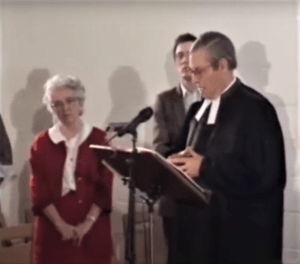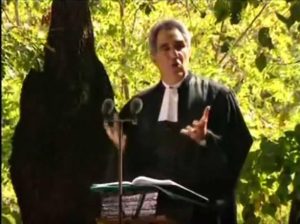Personal story
C. was born in Lyon and belonged, with her mother of German origin, to a welcoming Lutheran parish. This was where she received her pastoral calling.
She studied theology at the Faculté de théologie protestante in Paris, and then in Montpellier.
While studying she deeply felt the differences between Lutheran and Reformed ideas, notably over the sacraments, liturgy and attachement to tradition.
After completing her studies in Berlin and doing practical training in a Reformed Parisian parish, she was appointed to N. by the Commission des Ministères (Ministry Commission).
C.'s ministry in N.
The city of N has 60,000 inhabitants, among which a certain number of immigrants.
The town council made efforts to integrate the inhabitants, but until recently there was no church (not even a Catholic one) and no ecclesiastical buildings.
But C. enjoyed having a very young parish without traditions or history. It was small 15 to 20 at worship, parents with children; among which 40 to 50% were Africans; the others of Reformed origin, converted Catholics and Lutherans from Northern Europe.
C. discovered that the missionary aspect of her ministry was consistent with the welcoming tradition of the Lutheran Church.
Young people from 7 to 20 attended Bible lessons, then catechism for 3 years to make them familiar with Luther’s Petit Catéchisme (Small Catechism).
Specific Lutheran features
- A strong attachment to the sacraments: Holy Communion is celebrated every Sunday and always by a pastor (which was true in the Paris area, but not necessarily in Montbéliard). Holy Communion is the sacrament of Unity and pastors are ordained symbolising this Unity.
- The importance of baptism.
- The unchangeable order of the liturgy, focused on the cross. The uniqueness of the liturgy enables believers to become members of Lutheran communites in any country.
- The importance of personal piety: saying grace before meals and reading the Bible in the evening together is frequent in Lutheran families.
- The Eglise Evangélique Luthérienne de France (E.E.L.F.) (Evangelical Lutheran Church of France) wishes to keep its identity in the Lutheran-Reformed agreement.
- Lutherans are a minority within the small French Protestant community. But they feel as one with the World Lutheran Federation.
- There are 5 to 6,000 Lutherans in Ile de France (Greater Paris region) and in the south (E.E.L.F.), about 30,000 in the Montbéliard region (E.E.L.F.), and about 220,000 in the Alsace-Moselle region (E.P.C.C.A.A.L.)
- Future Lutheran pastors follow the same studies as the Reformed ones. The ministry commission chooses where they are first appointed.
- Lutherans are less in opposition with Catholics, as they were not as oppressed in their history. They acknowledge the need of a common witness when faced by other confessions.
The internal Lutheran Mission
It was created in Germany in 1850, and revived in France in 1980. It places emphasis on evangelisation and diaconal involvement.
It introduced the “ALPHA” course with evangelical training to non-believers, organises exhibits and visits, and also diaconal service, such as homework help, various training schemes, mutual aid, second-hand clothes sales.
For the internal Lutheran mission, evangelising and mutual aid go together and lay-people are given their rightful place.



